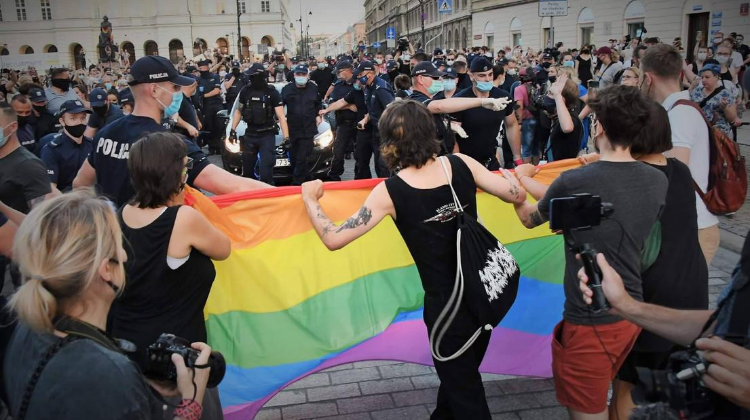Podcast: What’s it like being LGBTI in Poland in 2020?

Poland has reached a dangerous boiling point in its state-driven discrimination against LGBTI people. The first episode of ILGA-Europe’s podcast, The Frontline, goes behind the scenes to talk about a way forward for LGBTI activism in the country. Here’s what it’s all about…
Poland has been making international headlines over the past few years for its increasing state driven homophobia and transphobia, pushed by public representatives in both the political and religious arenas, but how is the situation experienced on the ground for ordinary LGBTI people? In the first episode of ILGA-Europe’s new podcast, The Frontline, we talk to Polish activist Slava Melnyk, from LGBTI organisation KPH, and David Socha, a young gay man living in the city of Pulawy, which was declared one of Poland’s so-called LGBT-Free Zones last year. Stay with us until the end to hear the ILGA-Europe team discuss the happenings in Poland as part of a wider trend, how Europe should respond, and strategic thinking for the Polish LGBTI movement.
“The issue is very divisive,” says Warsaw-based activist Slava Melnyk in an interview with The Frontline, ILGA-Europe´s brand new podcast. In the aftermath of the re-election of far-right President Andrzej Duda and protests in early August, in solidarity with activist Margot Szutowicz, who was arrested and now awaits trial, the situation for LGBTI people in Poland has reached a dangerous boiling point. However, despite state-driven LGBTphobia, illustrated by the rise of the so-called ‘Family Charter’ and LGBT-free Zones across the country, there are many Polish people who disagree with the ruling PiS party’s stance on ‘LGBT ideaology’.
“When I walk down the street, every other building has a rainbow flag as a gesture of solidarity and support for the movement,” says Melnyk.
In the very first episode of The Frontline we delve deep into the situation for LGBTI people in Poland and the work of activists amid the rise of official anti-LGBTI campaigning and the recent crackdown. Along with Slava Melnyk from KPH (Campaign Against Homophobia), David Socha, a young gay man living in one of Poland’s LGBT-free Zones, tells us about how this has affected his day-to-day life, and the ILGA-Europe advocacy team discuss the role of the EU institutions and external actors, and ways forward for the LGBTI movement in Poland.
David Socha was “shocked and enraged” when he learnt his town, Pulawy, had been declared an LGBT-Free zone. “I feel a sense of dread that people who pass by me might insult me,” he tells The Frontline. “I’ve heard from my friends that it only takes being in the wrong place at the wrong time, that will get you beaten… I’ve had friends saying that LGBTI people are ill and that they shouldn’t exist.”
On Monday 14 September, ILGA-Europe together with Polish LGBT rights organisations KPH (Campaign Against Homophobia) and Fundacja Równo?ci (The Equality Foundation) submitted a legal complaint to the European Commission about the so-called Family Charters and LGBT-free zones, which over 100 Polish local governments have adopted over the last two years.
“The European Commission and Council can no longer remain silent in the face of such blatant violations of the principle of non-discrimination by a member state,” said Katrin Hugendubel Advocacy Director of ILGA-Europe.
Rounding up our episode, Katrin and ILGA-Europe’s Senior Litigation Officer, Arpi Avetisyan talk about the trend that the rise of LGBTphobia in Poland is part of, strategic ways forward for the Polish LGBTI activists, and how Europe can take effective action to remedy the situation.
To access our timeline charting the rise of LGBTI hate in Poland, visit this link, check out Poland’s position in our Rainbow Map 2020 and the Poland chapter in our Annual Review 2020.